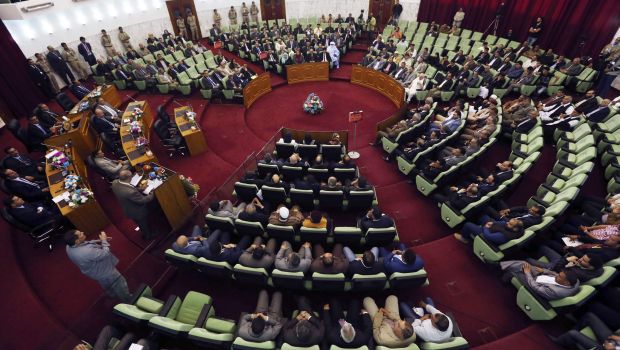
Members of the special body tasked to draft a new constitution for Libya and members of the General National Congress (GNC) gather during the body’s first meeting in Bayda April 21, 2014. (REUTERS/Esam Omran Al-Fetori)
The overthrow of Libyan leader Muammar Gaddafi in 2011 raised hopes that Libya could have a stable and democratic future. Instead, the eccentric and authoritarian “Guide of the Revolution” was replaced with destabilizing regional, tribal and ethnic divisions. Every town and city in Libya now claims to have its own laws. And, unlike in Tunisia, there is no president: Libya is trying to establish a parliamentary system, with a chairman of the General National Congress and a prime minister. But for now, it is closer to an anarchist’s paradise.
Libya’s capital, Tripoli, is about as far from Tunis as London is from Glasgow or New York is from Toronto, and the two countries share historical and economic ties as well as a 285-mile (459-kilometer) border. They were the closest trading partners in North Africa until the Arab Spring revolutions of 2011, and Libya is still Tunisia’s second-largest export partner after the European Union. A quarter of Tunisia’s oil used to come from Libya, although disputes for control of Libya’s oil facilities have stopped the flow. More than a million Libyans visit Tunisia each year.
When the Libyan conflict began in 2011, Tunisia oscillated between a cover of neutrality with regard to Gaddafi, undercover support for his opponents and attempts at mediation. NATO and Arab weapons were smuggled through southern Tunisia, while Gaddafi’s envoys took advantage of Tunisian airports and roads. Since 2011, Tunisia has been a refuge for both Tahaleb and Thuwar—former Gaddafi loyalists and former revolutionaries.
This year, as Tunisia’s national dialogue succeeded, Libya’s political system has been on the brink of collapse. Regionalist sentiments and the militias’ power had risen to the point where most of the country’s key oil terminals had shut, blocking most of the government’s revenue. By the end of March, Libya’s Prime Minister Ali Zeidan had been forced out in favor of a replacement, Abdallah Al-Thinni, who until his resignation on April 13 had a tenuous mandate that had to be renewed weekly. Now, a national dialogue is the solution favored by those who want to keep trying to see Libya’s experiment with parliamentary democracy succeed.
Local and foreign actors seem to think it would be a good idea to involve Tunisia in efforts to start a dialogue in Libya. In late March, the head of the UN Support Mission in Libya, Tarek Mitri, traveled to Tunis to ask for Tunisian assistance in resolving Libya’s political instability. The initial plan was for different Libyan groups to meet in Tunisia—a neutral territory—to discuss their country’s situation as a prelude to a Libyan national dialogue. But the talks were conducted separately by both President Moncef Marzouki and Ennahda’s Rachid Ghannouchi, in what seemed to be a competitive move by two former allies. Moreover, their rival, Beji Caid El-Sebsi, the head of leading secularist opposition party Nidaa Tounes, was not involved. It was a shaky start.
In Libya, both parties and movements affiliated to the Muslim Brotherhood and certain other groups welcomed the idea of the talks. However, the more liberal National Forces Alliance (NFA) rejected the initiative. Given Ennahda’s links to the Brotherhood, they claimed the Tunisian mediators were biased towards the Islamist movement. They argued dialogue should happen in Libya and be driven by Libyans. Led by former prime minister Mahmoud Jibril, the NFA is the largest coalition in the General National Congress and is considered Libya’s equivalent of Nidaa Tounes. Tunisia’s national dialogue could not have succeeded without Nidaa Tounes; likewise, Libya’s national dialogue cannot proceed without the NFA.
There have been alternative suggestions to bring the Libyan groups together; for example, there are suggestions in some quarters of a possible role for the European island state of Malta. Yet Tunisia remains the preferred option: it hosts a large Libyan community and it shares Arab and African ties with Libya. First, however, Tunisian mediators need to agree on a common strategy, setting aside their disagreements and moving beyond party-political calculations. Only then can Tunisians claim the neutrality and legitimacy needed to help Libya stage its national dialogue.
This article was originally published in The Majalla
All views expressed in this blog post are those of the author and do not necessarily represent the views of, and should not be attributed to, The Majalla magazine or Asharq Al-Awsat.
